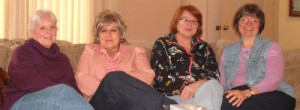By Jay Shenai
On a recent Tuesday night, 15 people sat in a circle on a couch and folding chairs, in a living room at the back of Silverton United Methodist Church. As they prepared to take in a lecture on healthier eating choices that help prevent cancer, more than a few made jokes about the plates of cookies and cupcakes that were still lined out on the coffee table in front of them.
“Well, those are for before the lecture,” said one attendee, laughing.
Providing a place for humor and togetherness is important to surviving cancer, said Mary Hodgkins, 62, founder of We Care Cancer Support.
Silverton United Methodist Church
203 W. Main St., Silverton
Meetings twice a month:
First Monday, 1 p.m., third Tuesday, 7 p.m.
For information, contact Mary Hodgkins:
503-873-6129
“If you’re around people that are positive, or can lift you up, I believe that helps a lot in the healing process,” she said.
Along with fellow cancer survivors Bobbie McCormich, Bucky Craig and Susan Salemma, Hodgkins launched the support group in October 2009. Meetings are twice a month at the church, and are open to men and women of any age and any type of cancer. Friends and family of those with cancer are also welcome.
Hodgkins, a breast cancer survivor who has endured two cancer scares in her life, started the group shortly after moving to Silverton from Fairhope, Alaska, last May. Despite being new to the community, she felt compelled to start We Care Cancer Support because she wanted to provide support and education for survivors like her, but also for those struggling with cancer treatment, something that was largely absent when she was first diagnosed in 1978, she said.
Salemma, a co-manager at Dress Barn in Woodburn, said she appreciates the informativeness as much as the support of the group. Her experience with a previous support group, after she discovered her breast cancer last March, had left her feeling isolated and hopeless because she felt it operated more like a clique.
She recalls walking into meetings where pre-formed groups congregated around each other, planning get-togethers amongst themselves instead of discussing coping skills or what to anticipate.
Some had been in remission for years, she said, or had never gone through the chemotherapy and radiation treatments she was then being subjected to. It only added to her isolation, she said.
“It didn’t do anything for me,” she said, “they could not relate at all.”
According to Hodgkins, We Care focuses on discussing needs and connecting people to resources. If someone needs a ride to a treatment appointment, or help bringing home groceries, others offer to assist them. Sometimes the needs can be surprisingly simple. She recalls one acutely suffering patient in a past meeting who, when prompted, asked only for a chance to enjoy a dinner alone with his wife. Within seconds, someone else in the group offered her daughter’s services as a babysitter.
The solution was sitting right across the room, Hodgkins said.
“And the solution sitting right across the room was so excited to be able to help,” she said.
Hodgkins and the others spend a lot of their time learning about the latest treatment options and medical research. McCormich, a nurse at Silverton Hospital, brings a medical knowledge and background that is particularly useful to the group.
But ultimately, it’s about providing perspective to neighbors in their darkest hour.
A cancer diagnosis is a life-altering event that few are ready for, said Craig, 69, a Silverton resident. She was diagnosed with breast cancer three years ago last January.
“Coming into it, you have no idea what you’re going to experience. And with this group, you’re able to help these people and try to explain to them your situation, or another situation, so that relatively they don’t feel alone,” she said.
“You don’t want to feel alone.”
For Salemma, whose family still mostly resides outside Oregon, the support group has become her family.
The best part, she said, is the opportunity to see others endure the same physical changes she’s suffering, and coming through to the other side.
“Just to be in the company of someone who is just a little bit ahead of you in their walk [with cancer], and you see that their hair has come back, that they’re going through their reconstructive surgery, that they’re becoming whole again. It gives you so much hope, because you’re in a place where you feel your body is out of control,” she said.
“When you’re alone and having all these fears… you can’t talk about it,” she said. “When you’re with others, they can reassure you. And you are going to be alright…”
As her voice trailed off in tears, Craig placed a hand on her shoulder to comfort her.
Sometimes the needs can be surprisingly simple.
